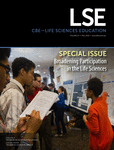Abstract
Private and public policies are increasingly aimed at supporting efforts to broaden participation of a diverse body of students in higher education. Unfortunately, this increase in student diversity does not always occur alongside changes in institutional culture. Unexamined biases in institutional culture can prevent diverse students from thriving and persisting in science, technology, engineering, and mathematics (STEM) fields. Given the daily personal interactions that faculty have with students, we suggest that individual educators have the opportunity, and responsibility, to improve the retention and persistence of diverse students. However, in our experience, faculty professional development programs often limit discussions of diversity to “comfortable” topics (such as learning styles) and miss opportunities to explore deeper issues related to faculty privilege, implicit bias, and cues for stereotype threat that we all bring to the classroom. In this essay, we present a set of social science concepts that we can extend to our STEM courses to inform our efforts at inclusive excellence. We have recommended strategies for meaningful reflection and professional development with respect to diversity and inclusion, and aim to empower faculty to be change agents in their classrooms as a means to broadening participation in STEM fields.



